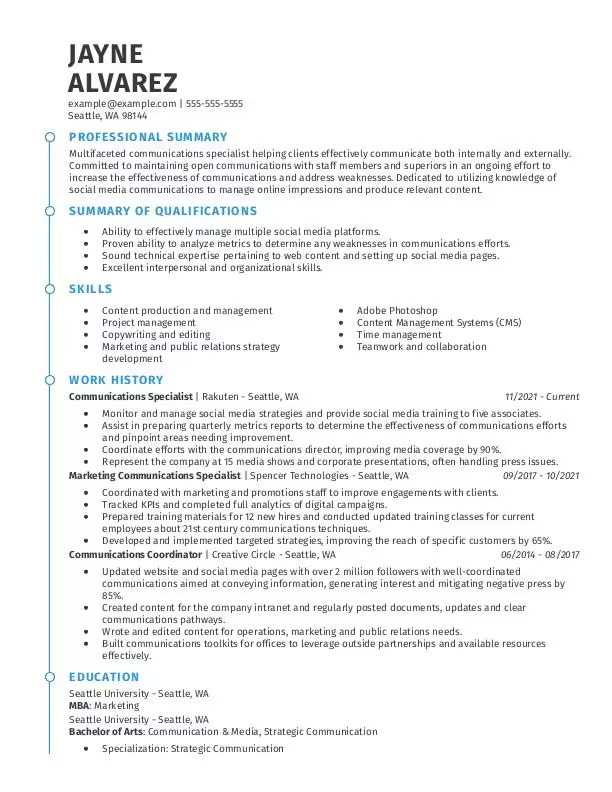Our customers have been hired at: *Foot Note
Preparing for a job interview for a corporate communication specialist position is crucial. With the right planning, you can ace the interview and land the job of your dreams.
Preparation means researching the company, the role and the industry, familiarizing yourself with the job description, and practicing your interview skills. Doing so can increase your chances of impressing the interviewer and securing the position.
Follow our tips and examples to gain valuable insights into interview questions for corporate communication specialists and stand out from your competition.
Common Communication Specialist Interview Questions
In today’s job market, countless applicants are trying to obtain the same position. You must make yourself stand out, and the best way to do that is to combine a well-written resume with unique interview answers that demonstrate your ability to fulfill the position.
Here are a few common corporate communications specialist interview questions and answers to accomplish that. Review and utilize them to develop your unique answers.
Tell Me about Yourself.
This question works as an “ice breaker" for many interviewers and helps them gain insight into your personality, work style and organizational fit. They want to get to know you!
- Structure your information: Organize your answer! Begin with the present, your current role, skills and experience. Highlight the past, emphasizing your previous work and how it relates to the job you’re interested in. Finish with the future, showcasing how your background can contribute to the role. This technique will help you organize your thoughts and present your response clearly and concisely.
- Emphasize your skills and expertise: Focus on the skills you have learnedthrough your experience that make you a strong fit for the corporate communication specialist position. Highlight your proficiency in strategic planning, media relations and crisis management, among other areas.
- Show your achievements: Interviewers want to learn about any notableaccomplishments or projects you have completed that demonstrate your skills and expertise. Remember to add metrics that can help them understand how you have contributed to the success of previous organizations and how you can add value to their team.
- Highlight your personality: Feature your personality, but keep it professional! Share relevant professional stories or anecdotes and focus on traits related to the job you're applying for.
- Keep it short: Provide a concise answer highlighting your professional experience and qualifications. Like an elevator pitch, your response should be brief and impactful.
Example 1:
“As a corporate communication specialist with eight years of experience, I excel in managing internal and external communication activities, including media relations, crisis management and employee engagement, with a 96% success rate.
My passion for creating and executing communication strategies that drive business objectives, as well as my project management and cross-functional collaboration expertise, have helped me deliver significant results in my previous roles. I am confident I can bring these skills and experiences to add value to any organization looking for a skilled and dedicated corporate communication specialist.”
Example 2:
“I began my career in corporate communications by overseeing social media and internal communications for a technology startup. This experience honed my ability to transform complex technical terminology into easily understandable language.
Over the last five years, I have progressed to spearheading comprehensive communication strategies for a Fortune 500 organization, which has resulted in remarkable improvements in our engagement metrics. By combining creativity with analytical thinking, I strive to deliver messages that inform and motivate individuals to take action.”
Why Do You Want to Work as a Corporate Communications Specialist?
With this question, hiring managers want to know why you chose this career. They are looking to see if you understand the role’s responsibilities and duties and have a genuine interest in the position.
You must highlight your skills, work history and passion for the role. They are looking for someone who can effectively communicate their abilities, experiences and desire to contribute to the organization's success.
When answering this question, you should:
- Express your interest in the company and role.
- Discuss your relevant skills.
- Talk about your passion for organization.
- Highlight your desire to contribute to this new role.
- End by expressing your excitement.
Example:
“I've always been passionate about the power of communication. As a corporate communications specialist, I see the potential to inform and inspire individuals and organizations to achieve their goals.
I believe effective communication is the foundation of any successful company, and I'm excited to participate. Overall, I see a career in corporate communications as an exciting opportunity to combine my skills and passion for communication with my desire to contribute to a company.”
What are your Key Strengths and Weaknesses?
When asking about your strengths, the interviewer wants to understand your unique skills and how they match the job's requirements.
For weaknesses, the interviewer wants to understand your self-awareness and ability to identify areas for improvement. They want to know how you handle challenges and how you are working to overcome your weaknesses.
Here are some examples of how to address this question.
Strength
It is important to focus on your strengths first, highlighting the top areas that make you a strong candidate. This is an excellent opportunity to showcase your transferable skills and how you can apply them to the desired role. Provide specific examples and achievements, including metrics, to support your strengths.
Example:
“My greatest strength is thinking strategically and tailoring my messaging to different audiences. I am skilled in analyzing complex information, prioritizing tasks and breaking it down into clear, concise language that resonates with internal and external stakeholders.
For example, one of my most notable achievements was implementing a communication campaign that increased 20% of employee engagement within six months. The campaign included tactics such as town hall meetings, newsletters, and interactive online platforms, all aimed at fostering transparent and open communication within the organization."
Weakness
Choose one or two areas for improvement that are not critical to the job and explain how you are working to overcome them through personal development or seeking feedback. Always end on a positive note by emphasizing your commitment to self-improvement.
Example:
“One of my weaknesses as a corporate communication specialist is my tendency to be overly critical of my work. While I strive for excellence, I sometimes struggle to recognize when a project is complete and ready for submission. To address this, I have developed a checklist of criteria for each project, which helps me to recognize when it is ready for approval.
Additionally, I have sought feedback from colleagues to ensure I meet their expectations and deadlines. I have already seen improvements in my confidence and delivery, and I am committed to continuing to develop this skill.”
Technical Communications Specialist Interview Questions
Hiring managers ask technical questions to assess your knowledge and technical skillsin specific areas related to your job responsibilities.
These questions help them determine if you possess the required expertise in media relations, crisis communication, internal communications or digital communication strategies.
By asking technical questions, interviewers can evaluate your ability to apply your knowledge to real-world scenarios and tasks, ensuring you are well-equipped to handle the role's challenges.
What Digital Communication Tools have you Managed?
Interviewers want to know about your knowledge of different software and tools commonly used in corporate communication environments, such as email marketing platforms, social media management tools, content management systems (CMS), project management software and video conferencing tools.
Hiring managers may also be interested in hearing about your experience in selecting and implementing specific tools for a business, your ability to integrate different tools to create a cohesive communication strategy, and your proficiency in optimizing the use of these tools for maximum efficiency and effectiveness.
Example:
“During my years of experience, I have managed a range of digital communication tools to engage with our target audience effectively. This includes email marketing platforms like Mailchimp and Constant Contact to create and execute impactful email campaigns. I have also managed various social media channels, utilizing tools like Hootsuite and Sprout Social to monitor engagement and drive brand awareness.
Additionally, I have experience with content management systems like WordPress and Drupal to ensure the timely and seamless delivery of relevant content on our company website.”
How Do You Measure the Success of Your Social Media Campaigns?
Interviewers want to assess your knowledge and experience in social media marketing. They want to know how you measure a social media campaign's success, which metrics you consider, and how you analyze the data to inform future campaigns.
They also want to evaluate your abilities to set goals, track progress, and adjust strategies based on the results. This question helps interviewers gain insight into your analytical skills, critical thinking abilities, and overall approach to social media marketing.
Example:
“Measuring the success of your social media campaign takes a combination of analytical skills, attention to detail and adaptability. Typically, I look at various metrics, including engagement rate, reach and click-through rate.
I also analyze the audience demographics and behavior to ensure we target the right people with the right content. I use tools like Google Analytics and social media insights to track conversions, website traffic and other key performance indicators to assess the overall impact of the campaigns.”
What Is Your Experience With Crisis Communication Tools and Platforms?
This is an excellent opportunity to highlight your experience managing crisis communication tools and platforms, such as emergency notification systems, social media monitoring tools and media relations platforms.
Talk about how you have used these tools to effectively communicate with clients during a crisis and developed crisis communication plans to ensure a timely and coordinated response.
While dealing with communication crises, emphasize your ability to stay calm under pressure and my commitment to transparency and honest communication during a crisis.
Example:
“I have extensive experience in managing crisis communication tools and platforms. For example, I have used social media monitoring tools such as Hootsuite and Sprout Social to track and respond to potential issues in real time. In addition, I have used media relations platforms like Meltwater to distribute timely and accurate information to key stakeholders during a crisis.”
Behavioral Communications Specialist Interview Questions
When answering behavioral interview questions as a corporate communications specialist, it is important to provide specific examples of past experiences and how you handled them. Here are some tips:
- Be specific.
- Provide detailed examples with metrics.
- Highlight your skills.
- Show critical and analytical skills.
- Emphasize teamwork.
- End with a positive note.
How Do You Prioritize Your Tasks and Responsibilities as a Corporate Communication Specialist?
This question offers you the chance to showcase several core competencies and skills. You can begin your answer by explaining the importance of prioritizing tasks and responsibilities to ensure communications are delivered effectively and efficiently.
Here are some tips to answer this question:
- Identify urgent tasks.
- Understand the organization’s goals.
- Focus on high-impact tasks.
- Delegate tasks to other teammates.
- Create a schedule.
Example:
“As a corporate communication specialist, I prioritize my tasks and responsibilities by understanding the organizational goals and objectives. I’m focused on high-impact tasks that significantly affect the organization and its clients. This has improved the team’s productivity by 15% in six months. I also delegate tasks that can be handled by other members of my team, which allows me to prioritize tasks that require my expertise.”
Tell Me About a Time When You Had To Use Your Creativity To Develop a Communication Plan or Campaign?
Your creativity is one of the most sought-after skills in the communication field. When answering this type of question, you can follow the STAR method to address your answer.
Situation: Describe the situation, context or challenge that required a creative solution.
Task: Explain the task or objective that needs to be accomplished.
Action: Detail the specific creative actions you took to address the task.
Result: Share the outcome or impact of your creative solution.
Example:
“In my previous role as a corporate communications specialist, I was tasked with developing a communication plan to promote a new product launch. To showcase the product's unique features, I created a series of videos featuring satisfied customers sharing their experiences with the product. Leveraging social media, I launched the campaign, which generated a 20% significant increase in product awareness and sales.”
How Have You Navigated a Difficult Conversation or Conflict With a Client, and How Did You Handle the Situation?
When interviewers ask this question, they want to assess your ability to handle challenging situations and client conflicts, emphasizing your soft skills. They are looking for several key qualities and abilities, including:
- Communication skills: They want to see if you can actively listen, empathize and articulate your thoughts clearly and professionally.
- Problem-solving and conflict resolution: Hiring managers want to know if you can think critically, propose creative ideas and collaborate with clients to reach a resolution.
- Emotional intelligence: This point addresses your ability to handle challenging situations with empathy, tact and professionalism without letting your emotions negatively impact the client relationship.
- Client relationship management: This is related to your ability to build trust, demonstrate a commitment to client satisfaction, and effectively manage client expectations.
Example:
“I once had a client who was dissatisfied with the progress of a project and became confrontational during a meeting. I actively listened to their concerns, acknowledged their frustration, and offered potential solutions to address the issue. Taking a calm and empathetic approach, we found a resolution that satisfied both parties and continued working together successfully.”
Situational Communications Specialist Questions
When interviewers ask a corporate communications specialist situational questions, they typically try to assess problem-solving skills, communication abilities, and ability to handle difficult situations.
They want to understand how you approach and navigate challenging scenarios, your ability to work under pressure, your level of professionalism, and your capacity to maintain positive relationships with clients or stakeholders.
Additionally, interviewers are interested in how you handle conflicts, negotiate and find mutually beneficial solutions.
How Do You Manage a Communication Crisis or High-Pressure Situation?
When asking this question, interviewers typically look for a few things. First, they want to see your experience dealing with high-pressure situations and crises. Second, they want to know how you approach problem-solving and decision-making under pressure.
They also want to understand your communication skills, including your ability to manage stakeholders, communicate effectively and provide transparent information. Finally, they are likely interested in your ability to handle stress, remain calm under pressure, and work collaboratively with a team to achieve successful outcomes.
Example:
“As a corporate communication specialist, I understand crises and high-pressure situations are inevitable and approach them calmly and rationally. I start by gathering all relevant information and working closely with my team to develop a comprehensive crisis communication plan that addresses the concerns of all stakeholders. I then communicate effectively and transparently, keeping all parties informed throughout the process and taking swift action to address any issues.”
What Actions Would You Take if a Campaign Didn’t Meet Expectations?
This situational question addresses your ability to analyze and evaluate campaign performance metrics and identify areas where the campaign fell short. Moreover, it shows your problem-solving skills and ability to develop corrective action plans to address the issues and improve future campaigns.
Additionally, interviewers are interested in how you use your communication skills, specifically your capacity to effectively communicate the situation to clients, manage expectations, and propose solutions to mitigate any negative impact.
Example:
“My first step would be to analyze the campaign performance metrics to identify where the campaign fell short. I would then work with my team to develop a corrective action plan, including strategies to improve future campaigns. I would communicate transparently with clients, acknowledging the issues and outlining the steps we are taking to address them and prevent similar issues in the future.”
Can You Describe a Challenging Situation You Face as a Corporate Communications Specialist?
Interviewers want to know you! With this question, they seek insights into your ability to handle difficult situations and problem-solving skills. They want to understand your experiences and how you navigate complex communication challenges, such as managing crises, handling sensitive information, or dealing with difficult clients. They also want to assess your ability to remain calm under pressure and effectively communicate and collaborate with others to find solutions.
Example:
“In my previous role as a corporate communication specialist, I faced a challenging situation during a product recall. I had to gather information from internal departments and external stakeholders, communicate transparently with customers, and coordinate with the public relations team to maintain our reputation. This experience demonstrated my ability to handle high-pressure situations, collaborate with cross-functional teams, and communicate effectively during crises.”
Tips for Answering Communications Specialist Interview Questions
Interviews require preparation, practice and confidence. Follow these tips to ace your interview!
Research the Company
Research is essential for your application and interview process. Here are some tips to follow to research the company effectively:
Visit the company website: Visit it to learn more about the company's products or services, mission, values and culture. Look for information about the company's history, leadership team and recent news or press releases.
Check their social media: Many companies have active social media accounts that can give you insights into their brand and culture and any recent events or initiatives they are involved in.
Use search engines: Conduct a Google search to find any information about the company that might not be available on their website or social media accounts. Look for news articles, reviews and any other information that might be relevant to your research.
- Look at company reviews: Check online reviews from current and former employees. This can give you insights into the company's culture, work-life balance, and overall employee satisfaction.
- Research the industry: Research the company's industry to understand trends, challenges and opportunities. This can help you understand the company's position within the industry and how it compares to its competitors.
Practice your Answers
Practice gives you confidence!
By practicing your answers, you can ensure that you clearly articulate your skills, experiences and achievements concisely and effectively. Practicing also helps to reduce nervousness and anxiety, allowing you to present yourself with more confidence and poise during the interview.
Additionally, you can identify potential gaps or weaknesses in your responses, allowing you to make adjustments and improve your chances of success.
Here are some tips:
- Review common interview questions.
- Consider the STAR method.
- Conduct mock interviews.
- Prepare questions to ask the interviewer.
- Practice your non-verbal communication.
- Practice speaking clearly and concisely.
Highlight Relevant Experience and Skills
To demonstrate your relevant experience and skills during the interview, it's important to carefully review the job description and prioritize your experiences and skills that match the job requirements. Additionally, providing specific examples with measurable outcomes that demonstrate how your experiences and skills have prepared you for the role is critical.
Key Takeaways
- Take the time to understand the responsibilities and requirements of the position thoroughly.
- Research the company and incorporate this knowledge into our answers to show your interest and alignment with the organization.
- Structure your information to present clear and concise answers.
- Practice and preparation are crucial to get confidence in your interviews.
- Showcase your enthusiasm and commitment.
- Take the interview process as an opportunity to show your professional brand and personality.
Our customers have been hired at:*Foot Note











